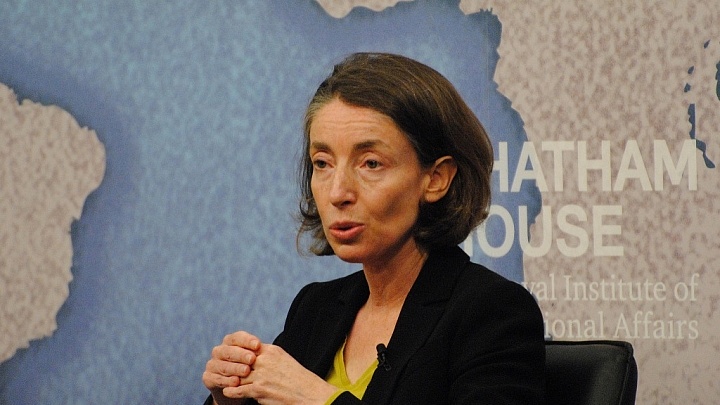I wonder what Marcus Tullius Cicero would have thought about Vladimir Putin. On one hand, the orator might not have disapproved. After all, “the land of the conquered belonged to the conquerors,” he once wrote. Cicero was writing well before late 20th century norms against territorial conquest had kicked in. Indeed, the parallels between the expanding Roman and Russian empires (at least in Putin’s imagination) are instructive. Even as Cicero condemned acts of injustice by Rome toward its empire’s subjects, he believed overall that Roman conquest and expansion was not a bad thing in and of itself and done “in justice.” Rule by Rome was preferable to rule by no one. In Cicero’s view, Greek Asia (today’s western Turkey) before Roman conquest was a wasteland of barbaric violence. As Stanford historian Ian Morris recounts in his recent book:
Fights, raids and battles were everyday activities, the Romans said, and every village was fortified. While a Roman gentleman might feel underdressed without his toga, a German felt naked without his shield and spear. The barbarians, Romans insisted, worshiped severed heads, which they like to hang outside their front doors (suitably treated with cedar oil to stop them from smelling). They sacrificed humans to their angry gods, and sometimes even burned them alive inside wickerwork statues. Tacitus was blunt: “Germans have no taste for peace.” Small wonder, then, that Cicero and his peers thought Rome was doing its neighbors a favor by conquering them.
Language by the Kremlin bears familiarity to its “civilizing” mission of Ukraine. Any country that sees pandemonium in the streets by protesters who literally chased out their president is unfit for self-rule, according to the Putin model of state-society relations, which builds off the ethos of Cicero during Roman times. As Putin said in a recent speech in Crimea, “The country has plunged into a bloody chaos, a fratricidal conflict, a humanitarian catastrophe has hit southeastern Ukraine. We will do all we can to stop this conflict as soon as possible and end bloodshed in Ukraine.” Like those uncivilized Greeks and Germans two millennia ago, such people surrender their sovereign right to exist. The victims, in this regard, are painted as “uncivilized, corrupt, and in general need of conquest,” writes Morris. Cicero also saw Rome as ruling by almost divine right, invoking God’s hand in protecting Italy from barbarians (Gauls, etc.) by creating the Alps. At its peak, Rome ruled over an area half the size of the continental United States, encompassing 60 million people that included Greeks, Egyptians, and Jews, as well as Celts and Germans. Putin similarly believes in the rejuvenation of a kind of tsarist-era Russian empire blessed by God, a landmass of Tatars, Chechens, and Cossacks, among others, that should rightfully stretch from Lvov to Vladivostok. Even Putin’s recent dalliances with the Russian Orthodox Church almost position him as a kind of interloper between the almighty and His flock.
Security-Insecurity Paradox
A number of commentators have remarked that Putin’s outward hostilities toward the West are a result of a deep-rooted insecurity, perhaps cultivated from decades of KGB service. Much as how after the Gauls sacked Rome in 390 BC, the Romans would develop a kind of insecurity that would require them to constantly expand and pursue military glory, if nothing else than to keep subjects busy (never a bad thing for avoiding civil war), devour more lands and extract more resources. The Kremlin operates from a similar mindset of paranoia, whereby it sees itself as having fallen victim to and been disrespected by its Western peers – NATO enlargement, the Kosovo war, and so forth – and now is securing itself by taking lands (Crimea, Abkhazia, South Ossetia), acquiring resources, and using more bellicose rhetoric. Cicero believed that war could be fought to protect the safety and honor of the state. In this way, Cicero sounds an awful lot like Putin, who believed the breakup of the Soviet Union was a major travesty. War is justified in Putin’s eyes if it means restoring the state. Borrowing from Greek philosophy, writes Alex Bellamy, author of Just Wars: From Cicero to Iraq, “Cicero believed that the proper role of the state was to maintain a balance between nature and law in order to facilitate the pursuit of justice and, hence happiness.”
If Putin is motivated by his belief that Russians desire to live in “peace unharmed,” then expansionist wars like the one we see in Ukraine are justified “to enlarge the boundaries of peace, order, and justice.” Putin has indeed sounded the role of peacemaker, even invoking human rights language (such as the Responsibility to Protect, or R2P, doctrine) and labeling Russian forces in Ukraine as “peacekeepers.” We need to consolidate and mobilize but not for war or any kind of confrontation for hard work in the name of Russia, he said in a recent speech. We will do everything in our power so that this conflict is ended as soon as possible, so that the blood can stop flowing in Ukraine. Cicero’s rhetoric on war and peace sounded a similar note, hedging his justification of war to ensure peace. As he told the senate not long after Caesar’s death: “The name of peace is sweet, and that condition itself is salutary; but between peace and slavery there is a very great difference,” adding “I am not opposed to peace, but I fear war rolling upon us under the name of peace. So then if we would enjoy peace, we must wage war; if we give up the war, we shall never enjoy peace.” Cicero was no pacificist, as G.A. Harrer wrote. But he believed war was horrible. In my opinion, he wrote, we should always plan for peace, peace which will involve no treachery. In regards to Antony, who Cicero was warring with, he said, “Peace made with them will not be peace, but an agreement for our own slavery.” This is a similar predicament Putin finds himself in: To live in peaceful harmony with NATO and the new Ukrainian government is seen as a psychological loss, both of prestige and of a chunk of land thought of by him as territorial Russia. To back down is akin to a kind of “slavery” at the hands of Europe and the United States. But it is hard to imagine achieving peace that leaves in place a sovereign Ukraine, but with no treachery on the part of Putin.
Putin appears to be reliving, and perversely relishing, the ethos of the early Romans, wracked by insecurity, isolated and surrounded by enemies and barbarians.
In their larger worldviews on how humans and states interact, Cicero and Putin could not be more different. During Roman times, as Plato had written previously, war was believed to be the normal state of affairs among states. But Cicero disagreed with this, believing that peace was both achievable and should be the norm. Unless waged “to punish a wrong or to beat back an attacking enemy,” he wrote, “no just war can be waged.” Rulers, moreover, were expected to stay true to their word. Treaties, he felt, were inviolable. During Roman times, the worst possible insult that could be said of a people – like, say, the Carthaginians – was to call them “a breaker of treaties,” he wrote. Russia is in violation of several treaty obligations – including its 1994 Budapest memorandum that guaranteed respect for Ukrainian sovereignty and independence in exchange for its de-nuclearization. Thus, Cicero would disapprove of the means Putin is using to spread his brand of Russian civilization.
Stand Your Ground
A phrase invoked on both sides of the crisis over Ukraine is self-defense, which has a long resonance in international affairs – and is codified in Article 51 of the UN Charter – but has gotten a second wind in recent years. For Cicero and other early adherents to just war doctrine, war –and by extension, the act of killing – in self-defense was justified and legitimate. He also argued that the way in which man fought wars matter, so as to avoid the loss of innocent lives. He did not approve, for example, of indiscriminate or disproportionate violence. Contrast Cicero’s view with that of later Christian theologians like St. Augustine of Hippo, who is often credited with developing the just war tradition. For Augustine, war in self-defense was not what was sinful, or unjust. In his view, the combatant who is killed will “soon die in any case.” And so one who kills in self-defense is just shortening the other’s life. What is sinful and unjust is not the killing per se, but instead the “love of violence, revengeful cruelty, fierce and implacable enmity, wild resistance, and the lust of power” that war generated and which was corrosive of human nature and societies. As such, wars had to be fought for the right intentions. But then how does one deduce intentionality? It would require the peering into the hearts and minds of commanders and leaders to see what they really sought. Because of the impossibility of this task, Augustine sought other criteria, that could act as proxies of right intention, among them wars fought in self-defense, wars fought against aggressors that refuse to redress previous wrongs (e.g. return lands or resources previously seized); and wars ordered by God. But this raises more than a few contradictions: If two religious states or nonstate actors go to war and both are mandated by their respective gods to carry out the fight, can both be fighting a just war? For one side to be fighting a just war, does that not imply that the enemy is fighting an unjust one? Moreover, can both parties justify the use of force in self-defense? To be sure, two opposing sides can be fighting unjust wars – perhaps a case can be made Ukraine’s civil war fits this example – but two sides cannot both be fighting just wars. From a Christian theologian’s perspective, Putin probably thinks he is fighting a just war, given that he believes Russia and his local self-defense forces are acting in self-defense, is redressing a previous wrong, and is acting on behalf of some higher power.
Of course, all wars are unique. One would think Cicero may have updated his views on just war had he lived two millennia but likely would have seen the unjustness of Russias current incursions into Ukraine. Putin, however, appears to be reliving, and perversely relishing, the ethos of the early Romans, isolated, wracked by insecurity, surrounded by enemies and barbarians. Even if he truly wants peace for Russia, he appears willing to raze all of Eastern Europe to achieve it. Theres nothing just about that.
[Photo source: Flickr Creative Commons]
Lionel Beehner is formerly a senior staff writer at the website of the Council on Foreign Relations, where he was a term member. He has reported from over two-dozen conflict or post-conflict zones, including Iraq, Sri Lanka, and the Balkans. He is a member of USA Today’s Board of Contributors and is a PhD candidate at Yale, focusing on nonstate actors and the use of force.



Russia is asserting its ethnic roots. Inside its national boundaries the shift to Slavic hierarchy is the same “intentionality” we see overflowing into surrounding multicultural enclaves. The entire world needs to be on alert for anyone speaking their language, being prone to declaring those same sovereign caustic claims. The former USSR was governed by a ruling class called the “Supreme Soviet”.
Actually a Kremlin failed policy. He was one of Russia’s stable of despots after all (like Assad and Saddam). The situation Libya is in now is entirely down to Gadaffi’s legacy of Russian armed tyranny and incompetence.